Speakers line-up
Session 1: Applying AI in Clinical Drug Development
Session Chair: Ruth Plummer (CDDF, UK)
—————————————————————————————————————————————————————–

Dónal Landers (Digital Experimental Cancer Medicine Team, CRUK Manchester Institute, UK)
Dónal Landers is Strategic Director of the digital Experimental Cancer Medicine Team (ECMT) based at the Centre for Cancer Biomarker Sciences, Cancer Research UK (CRUK) Manchester Institute. The digital ECMT is a clinical decision science research group. Its mission is to provide next-generation cancer-patient care through comprehensive data-driven evidence to transform clinical decision-making, evolve the role of patients and improve patient outcomes. The digital ECMT has developed and implemented the Technology Clinical Trial model at The Christie to enable formal testing of AI methods, software and useability of devices in an oncology patient setting, which also encompasses ethical AI design. After obtaining his primary medical degree from Trinity College, Dublin, Dr Landers spent several years practising medicine as a clinical research registrar in HIV Medicine and Infectious Diseases. He undertook an MBA at University College, Dublin before transitioning to hospital senior management at St. James’s Hospital in Dublin. Here, he was responsible for Casemix strategy and clinical performance improvement, simultaneously collaborating with the Department of Health and Children on National Clinical and Health Informatics initiatives. He conducted computer science research with Dublin City University on clinical object database development. Dónal co-chaired the IT stream for the first NCI All Ireland Cancer Conference established as part of the Good Friday peace process. After several years of working within technology start-up companies, Dr Landers co-founded his own health informatics company developing patient-centric mobile technology solutions, which empowered patients to collect and monitor their personal health data. He subsequently joined PricewaterhouseCoopers as a senior specialist consultant, becoming sectoral lead for the healthcare and pharmaceutical industry. Dr Landers joined AstraZeneca (AZ) in 2010 as a Pharmaceutical Physician in Early Clinical Development (ECD). Later, as Senior Director Physician in ECD, Innovative Medicines and Clinical Discovery, he led AZ’s first extensive multi-drug oncology umbrella study in bladder cancer (BISCAY) before going on to lead the digital ECMT and set up his own specialist consultancy, DeLondra Oncology. Dr Landers is a specialist in Pharmaceutical Medicine and a Fellow of the Faculty of Pharmaceutical Medicine at the Royal College of Physicians and has completed his specialist training (CCT). He holds a Postgraduate Certificate in Translational Medicine from the University of Manchester and registered on the GMC specialist register. He is a member of both ASCO and ESMO.
Session 2: Digital Tools in Clinical Trials
Session Chairs: Ruth Plummer (CDDF, UK); Donna Graham (The Christie / Digital Experimental Cancer Medicine Team, UK)
—————————————————————————————————————————————————————–
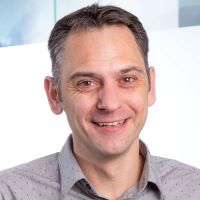
Larsson Omberg (Sage Bionetworks, USA)
Dr. Omberg’s research effort focuses on two areas – using remote sensors and mobile phones to measure disease; and collaborative genomic research. His work actively uses open and team based science to get a large number of external partners to collaborate on data intensive bioinformatics and data science problems. This includes establishing norms and methods for measuring disease phenotypes using remote sensors and developing analytical approaches for turning raw signals from sensors into digital biomarkers. Dr. Omberg and the Systems Biology group have been involved in over two dozen mobile health studies ranging from Chronic Anemia to Parkinson’s Disease to cardiorespiratory fitness. As a graduate student and postdoctoral researcher at the University of Texas and Cornell University Dr. Omberg developed machine learning and statistical approaches for extracting genomic phenotypes and disease signals from system level biological data. After establishing a data science group at Sage Bionetworks his expertise was applied to coordinating data integration and integrative analysis for the TCGA Pancancer collaboration, The Progenitor Cell Biology Consortium as well as the international ICGC/TCGA Whole Genome Pan-Cancer Analysis among other projects. Dr. Omberg received a Ph.D. in physics from the University of Texas at Austin.
—————————————————————————————————————————————————————–
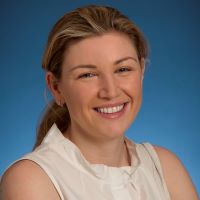
Donna Graham (The Christie, Digital Experimental Cancer Medicine Team, UK)
Dr Donna Graham is a Medical Oncology consultant with the Experimental Cancer Medicine Team and serves as clinical lead on the Technology Clinical Trials team within digital ECMT and on the Research Digital Programme Board in The Christie Hospital in Manchester. She has a decade of experience in cancer clinical trials with a focus on early phase research and, more recently, use of technology for patient benefit. She also leads a work package in the international UpSMART Consortium, investigating and promoting use of technology in Early Phase Oncology Trials.
—————————————————————————————————————————————————————–

Chris Plummer (Newcastle Hospitals NHS Foundation Trust, UK)
Chris Plummer is a consultant cardiologist in Newcastle upon Tyne, UK. His clinical and research interests include cardio-oncology – the expanding specialty focused on the cardiovascular effects of cancer and its treatment, where he is secretary of the British Cardio-Oncology Society and a Nucleus Member of the European Society of Cardiology Council of Cardio-Oncology. He is also Chief Clinical Information Officer in Newcastle and the Regional Health Information Exchange, where he works with clinical and University researchers to use routinely collected data from digital patient records to identify patients who may be suitable for clinical trials, and develop novel surrogate end-points and precision targeting for experimental medicine.
—————————————————————————————————————————————————————–

Ib Alstrup (Danish Medicine Agency, DK)
Ib Alstrup is a Medicines Inspector, GxP IT, with the Danish Medicines Agency (DKMA). Having an IT background himself, he has specific focus on inspection of regulated parties’ validation and safe operation of computerised systems throughout all GxP areas. He is an EMA expert, a co-writer of the EMA GCP Guidance on Electronic Systems and the PIC/S Guidance on Data Integrity, is a frequent speaker at conferences and he has trained a number of inspectorates and individual inspectors, both European and abroad. Prior to joining the DKMA in 2017, he has been 14 years with Novo Nordisk, working as an IT QA for large enterprise systems and later, as a Principal Specialist, Lead Auditor, conducting a very large number of audits of IT and equipment suppliers, analytical laboratories and CROs, around the world. Prior to this, he has been 11 years with Ericsson, where he covered positions from System Designer and Tester to Organisational Quality Manager. He holds a B.Sc. in Electronic Engineering.
Session 3: Clinical Decision Support Tools and Clinical Practice
Session Chairs: Nafsika Kronidou-Horst (Roche, CH); Torsten Haferlach (Munich Leukemia Laboratory, DE)
—————————————————————————————————————————————————————–

Torsten Haferlach (Munich Leukemia Laboratory, DE)
Prof Dr Dr Torsten Haferlach is one of the world’s leading experts in the field of leukemia; engaging in ground breaking research, the development of new diagnostic tools as well as the link to treatment options, he has always been pushing its boundaries of his chosen field, now also introducing AI in routine workflows of leukemia diagnostics. With an MD in medicine as well as a PhD in Germanistics, and a habilitation that already sets standards in the leukemia diagnostic field, he spent the first part of his career as a medical doctor and hematologist, first at the university clinics in Kiel and Göttingen then at the university clinic in Munich where he acted as both the senior physician at the Department of Internal Medicine and the Head of the laboratory for leukaemia diagnostics.In 2005 he set up the Munich Leukemia Laboratory (www.mll.com) together with three colleagues from complementary disciplines. Today the lab processes with a team of 210 employees over 90,000 blood or bone marrow samples per year, his practice treats more than 4,500 patients, and he is one of the major contributors to knowledge in this area: well over 600 articles have been published in top ranking, peer-reviewed medical journals since the lab’s inception. Prof Haferlach himself has authored and co-authored more than 590 articles over the course of his career. He is constantly contributing to the evaluation and dissemination of scientific knowledge in his chosen field: as reviewer of leading journals including the New England Journal of Medicine, Blood, Leukemia, Haematologica and The Lancet Haematology, as member of editorial boards for journals such as Leukemia, Annals of Hematology, and Leukemia Research, as sought-after speaker on medical conferences around the world, and by serving on the advisory boards of companies such as Illumina, Jazz and AWS.
—————————————————————————————————————————————————————–
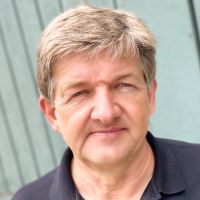
Joachim H. Schmid (Roche Tissue Diagnostic, USA)
Dr. Joachim Schmid has over 21 years’ experience in the diagnostics industry. He joined Roche Tissue Diagnostics (RTD) in 2014 as the Director of Engineering, and became Vice President of Research & Development in 2015. In this role, Joachim oversees the R&D organization focusing on the development of instrumentation, enterprise software and imaging algorithms to support RTD Digital Pathology business. Previously, he worked at Tripath Imaging and as the R&D director at Dako. He holds a Dr. Ing. Degree, Faculty of Electrical Engineering and a Diplom of Electrical Engineering, both from the University of Stuttgart (Germany).
—————————————————————————————————————————————————————–
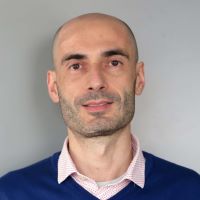
Gabriele Mazzini (European Commission, IT)
Gabriele Mazzini has worked at the European Commission on legal and policy questions raised by new technologies since August 2017. He designed and co-drafted the proposal for the Artificial Intelligence Act (April 2021) and is currently focusing on the negotiation of the proposal with the Parliament and the Council. Previously Gabriele held several positions in the private sector in New York and served in the European Parliament and the Court of Justice. He holds a LLM from Harvard Law School, a PhD in Italian and Comparative Criminal Law from the University of Pavia and a Law Degree from the Catholic University in Milan. He is qualified to practice law in Italy and New York.
Session 4: Digital Tools Supporting Innovative Patient Care
Session Chairs: Denis Costello (CML Advocates Network, ES) & Jan Geisler (Patvocates, DE)
—————————————————————————————————————————————————————–
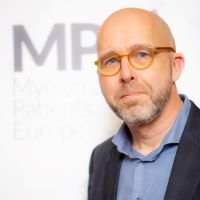
Hans Scheurer (MPE, NL)
Hans Scheurer is president of the pan-European organization Myeloma Patients Europe (MPE) since 2016. He is a myeloma patient since 2005, and active as a patient advocate for the myeloma community since 2008. Being an educationalist, he started writing for patients about medical developments and all innovation in the myeloma field, with a passion for understandable language for patients. In his current role, he focuses on good governance of the patient community of MPE and mentoring/coaching new patient groups across the EU, with the goal of shaping meaningful patient involvement and, and in general the professional development of patient advocacy. He is active in many consortia representing the patient perspective, like EMA procedures and committees, the WECAN consortium of Cancer patient umbrella organizations, the HOVON Myeloma workgroup in the Netherlands, SISAQOL-IMI.
—————————————————————————————————————————————————————–
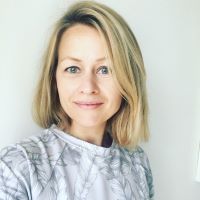
Sanna Ivanainen (Oulu University Hospital, FI)
Dr Iivanainen works as a medical oncologist in Oulu University Hospital (Oulu, Finland), with a special interest in lung cancer and melanoma patients, and immuno-oncology. Her thesis (2020) “Real-world perspectives on cancer patients receiving immune checkpoint inhibitors” introduced novel prognostic biomarkers to enhance the clinical value of immune checkpoint inhibitors (ICIs) and revealed that digital symptom follow-up of cancer patients treated with ICIs is feasible. Her post-doctoral research has focused on developing machine learning based prognostic models based on ePRO symptom data and other clinical data from advanced cancer patients receiving ICIs. Dr Iivanainen works also as a clinical lecturer in Oulu University teaching future doctors. She has operated as a principal investigator in clinical trials focused on immuno-oncology for lung cancer and melanoma.
—————————————————————————————————————————————————————–
 Bleddyn Rees (European Connected Health Alliance, IE)
Bleddyn Rees (European Connected Health Alliance, IE)
Bleddyn Rees is a vastly experienced commercial and international healthcare lawyer, Deputy Chair of the European Connected Health Alliance, Chair of the Digital Health Society and Chairs the Digital Working Group of All Policies for a Healthy Europe. He has unique experience for a private sector lawyer having spent almost four years seconded to the Commercial Directorate of the UK Department of Health as General Counsel. Bleddyn Rees has a special interest in Digital Health and Medtech.
Session 5: Integration of Patients in Digital Tool Trial Design and Development
Session Chairs: Nathalie Bere (EMA, DE) ; Dónal Landers (Digital Experimental Cancer Medicine Team, CRUK Manchester Institute, UK)
—————————————————————————————————————————————————————–
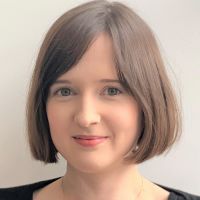
Leanna Goodwin (Digital Experimental Cancer Medicine Team, CRUK Manchester Institute, UK)
Leanna Goodwin is a Research Practitioner in the digital Experimental Cancer Medicine Team based at The Christie NHS Foundation Trust in Manchester, UK. Leanna works in this patient-facing role on Technology Clinical Trials, which seek to collaborate with patients and healthcare professionals to develop innovative care pathways.
—————————————————————————————————————————————————————–

Leanne Philips (Manchester Foundation Trust / Digital ECMT, UK)
Following the completion of the medical degree at the University of Newcastle Leanne Philips has worked in clinical medicine for the past 11 years, more latterly specialising within the field of nephrology. In 2017, she joined the Digital ECMT team specifically to explore the interface between cancer and kidney disease and ultimately improve care and outcomes for kidney patients with cancer. Leanne Philips leads a Research Study at The Christie Hospital in Manchester, assessing the use of Point of Care Testing of kidney function in the home for patients receiving cancer treatments.
—————————————————————————————————————————————————————–
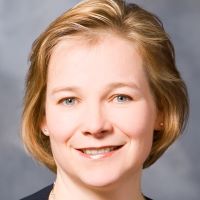 Petra Wilson (FTI Consulting, USA)
Petra Wilson (FTI Consulting, USA)
Petra Wilson has been working in EU level digital health issues for over 25 years, including time spent within the European Commission, the International Diabetes Federation, the European Health Management Association, as well as in industry and academia. In all these roles her focus has been on maximising the use of health data for the benefit of patients, healthcare systems and research, whilst protecting the privacy interests of individuals.